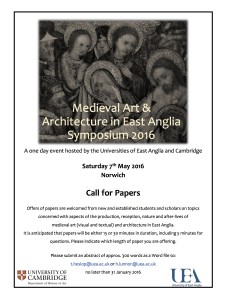Medieval Sexualities: An Interdisciplinary Conference
Institute of Archaeology, UCL
11-12 June 2016
The Northern/Early Medieval Interdisciplinary Conference Series is pleased to invite proposals for papers on medieval sexualities. This interdisciplinary event will explore how different forms and concepts of sexuality are represented and produced in the medieval context though textual, material, archaeological, visual and musical sources. For example, how are sexualities communicated though medieval art and writing? How are material objects used to create, encode and communicate particular identities? Whether absent or present, sexuality in medieval texts is equally telling. From the Anglo-Saxon Wife’s lament to the lamenting lover of 12th and 13th century troubadours, the taboos and editing of Apollonius of Tyre, Aelfric’s virgin martyrs, the sexualized devotion of Margery Kempe and the clever ruse of the Anglo-Saxon Judith, the power of sexuality is ubiquitous. Manuscript illustrations abound with scenes of eroticism, as do the carvings on later medieval churches. Sexuality in the Middle Ages is a topic that has steadily started to receive more serious attention from scholars. This conference will explore the significance of these varied (re)presentations of sexualities in literature and visual art looking at agency and voice, power and satire.
We invite proposals for papers of 20 minutes each on any aspect of sexuality, from researchers in any discipline, and considering any medieval culture.
Possible topics include but are not limited to:
- Sex and gender relations in medieval literature/music/material culture
- Perceptions and self/representation of sexuality in the Middle Ages
- Tropes of sexuality in medieval cultures
- The role of sexuality in material objects, graves and other areas of archaeological interest
- Gradual change of expression in sexualities throughout the medieval period
- Sexuality and medieval gender identity
- The absence or presence of sexuality: sexuality as an absent presence
- Social norms and boundaries of individuals and cultural groups such as monastics, musicians and others
- Seductions, taboos and transgressions
- Sex, devotion and the body in medieval mysticism
- The landscape and medieval sexualities
- Papers exploring the treatment of medieval sexualities and gender in modern contexts and media, such as games, films and graphic novels, are also welcome.
Abstracts of 250 words are invited for submission by 10 May 2016. Please email abstracts to the conference committee at NEmics2016@gmail.com.
